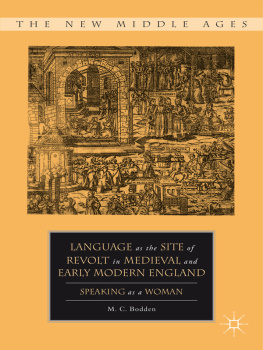THE GREAT REVOLT OF 1381
CHARLES OMAN

This 2011 edition published by Barnes & Noble, Inc.
All rights reserved. No part of this publication may be reproduced, stored in a retrieval system, or transmitted, in any form or by any means, electronic, mechanical, photocopying, recording, or otherwise, without prior written permission from the publisher.
Barnes & Noble, Inc.
122 Fifth Avenue
New York, NY 10011
ISBN: 978-1-4114-5301-2
PREFACE
I F Andr Rville had survived to complete his projected history of the Great Revolt of 1381, this book of mine would not have been written. But when he had transcribed at the Record Office all the documents that he could find bearing on the rebellion, and had written three chapters dealing with the troubles in Norfolk, Suffolk, and Hertfordshire, he was cut off by disease at the early age of twenty-seven. All his transcripts of documents, together with the fragment relating to the three shires above named, were published by the Socit de l'cole des Chartes in 1898, with an excellent preface by M. Petit-Dutaillis. the fruit of much hard work at the Record Office. By an unfortunate coincidence Andr Rville had completed his East Anglian section, and that section only, at the moment of his lamented and premature death, so that the detailed story of the revolt in Norfolk and Suffolk has been told twice from the official sources, and that of the rest of England not at all.
Rville's collection, together with the smaller volumes of documents published by Messrs. Powell and Trevelyan in 1896 and 1899, lie at the base of my narrative. I may add that there is also some new and unpublished material in this book, the results of my own inquiries into the Poll-tax documents at the Record Office. I think that I have discovered why that impost met with such universal reprobation, how the poorer classes in England conspired to defeat its operation, and how the counter-stroke made by the Government provoked the rebellion. The records of the Hundred of Hinckford, printed in my third Appendix, are intended to illustrate the falsification of the tax-returns by the townships and their constables. The fourth Appendix, the 'Writ of Inquiry as to the Fraudulent Levying of the Poll-tax' of March 16, 1381 (never before printed, as I believe), is all-important, as showing the manner in which the Government prepared to attack the innumerable fabricators of false returns. This writ, with its threats of imprisonment and exactions levelled against a large proportion, probably a majority, of the townships of fifteen shires, may be called, with little exaggeration, the provocative cause of the whole revolt. Urban and rural England were alike seething with discontent in 1381, but it required a definite grievance, affecting thousands of individuals at the same moment, to provoke a general explosion, such as that which I have here endeavoured to narrate. Without that writ of March 16 town and county would have gone on indulging in isolated riots, strikes, and disturbances, as they had been doing for the last twenty years, but there would probably have been no single movement worthy of being called a rebellion.
I have ventured to insert as my fifth and sixth Appendices two long documents which have already been published, but which are not very accessible to the student, because the volumes in which they are to be found are out of print. They are of such paramount importance for the detailed history of the rebellion that no student can afford to neglect them. The first is the so-called 'Anonimal Chronicle of St. Mary's, York', of which Mr. George Trevelyan published the French text in the English Historical Review, part 51. I have made an English translation of it, and by his kind permission, and the courtesy of Dr. Poole, the editor, and Messrs. Longmans, the proprietors, of the Review, am allowed to reproduce this most valuable document. This chronicle appeared after Rville's death, so that his narrative chapters were written without its aid. The second is the long inquest of November 20, 1382, on the doings of the chief London traitors, Aldermen Sibley (or Sybyle), Horne and Tonge, and Thomas Farringdon. This document formed part of Andr Rville's transcripts: the Socit de l'cole des Chartes, who possess the copyright of his Collections, granted me leave to republish it. All previous narratives of the London rebellion have to be rewritten, in view of this most interesting revelation of the treachery from within that opened the city to the rebels.
I have to acknowledge kind assistance given me by the following friends, to whom I made application on points of difficultyMr. C. R. L. Fletcher of Magdalen College, Oxford, Professor W. P. Ker of All Souls College and London University, Mr. Hubert Hall of the Record Office, Dr. F. G. Kenyon of the British Museum, and Dr. Murray of the Oxford English Dictionary. Last, but not least, must come my testimony to the untiring assistance of the compiler of the Indexthe seventh made for me by the same devoted hands.
C. OMAN.
O XFORD ,
May 3, 1906.
LIST OF MAPS


CHAPTER I
INTRODUCTORY
E NGLAND IN 1381
F EW of the really important episodes of English history are so short, sudden, and dramatic as the great insurrection of June 1381, which still bears in most histories its old and not very accurate title of 'Wat Tyler's Rebellion'. Only a short month separates the first small riot in Essex, with which the rising started, from the final petty skirmish in East Anglia at which the last surviving band of insurgents was ridden down and scattered to the winds. But within the space that intervened between May 30 and June 28, 1381, half England had been aflame, and for some days it had seemed that the old order of things was about to crash down in red ruin, and that complete anarchy would supervene. To most contemporary writers the whole rising seemed an inexplicable phenomenona storm that arose out of a mere nothing, an ignorant riot against a harsh and unpopular tax, such as had often been seen before. But this storm assumed vast dimensions, spread over the whole horizon, swept down on the countryside with the violence of a typhoon, threatened universal destruction, and then suddenly passed away almost as inexplicably as it had arisen. The monastic chroniclers, to whom we owe most of our descriptions of the rebellionWalsingham and his fellowswere not the men to understand the meaning of such a phenomenon; they were annalists, not political philosophers or students of social statics. They only half comprehended the meaning of what they had seen, and were content to explain the rebellion as the work of Satan, or the result of an outbreak of sheer insanity on the part of the labouring classes. When grudges and discontents have been working for many years above or below the surface, and then suddenly flare up into a wholesale conflagration, the ordinary observer is puzzled as well as terrified. All the causes of the great insurrection, save the Poll-tax which precipitated it, had been operating for a long time. Why was the particular month of June 1381 the moment at which they passed from causes into effects, and effects of such a violent and unexpected kind? What the Poll-tax was, and why it was so unpopular, we shall soon see. But its relation to the rebellion is merely the same as that of the greased cartridges to the Indian Mutiny of 1857. It brought about the explosion, but was only one of its smaller causes. Things had been working up for trouble during many yearsonly a good cry, a common grievance which united all malcontents, was needed to bring matters to a head. This was what the Poll-tax provided.














